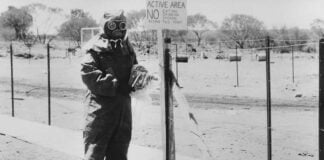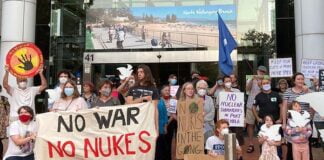Rudd’s aggressive determination to support NATO in Afghanistan is almost the flip side to that of his position on Iraq, seeing it as the “good” war, with the occupation of Iraq the “wrong” war. The Labor government sees Afghanistan as the real war on terror, where the west is confronting “Islamofascism” and fighting to “liberate Afghani women”.
Less than one month after winning the federal election, Kevin Rudd paid a surprise visit to Australian troops in Afghanistan, also calling in on prime minister Hamid Karzai.
Rudd pledged more troops for Afghanistan and promised to stay for the “long-haul”. Not long after his visit, defence minister Joel Fitzgibbon attacked the Howard Government for their lack of involvement in the formulation of NATO strategy for Afghanistan.
Rudd’s aggressive determination to support NATO in Afghanistan is almost the flip side to that of his position on Iraq, seeing it as the “good” war, with the occupation of Iraq the “wrong” war. The Labor government sees Afghanistan as the real war on terror, where the west is confronting “Islamofascism” and fighting to “liberate Afghani women”.
This is an imperial fantasy. There has been no liberation for women under Karzai, and the only achievements of the US-led invasion have been to revitalise the country’s opium-growing industry-it now produces 97 per cent of the world’s supply-and to re-galvanise support behind the Taliban and other opposition forces.
On 17 February, Kabul was hit by its most destructive insurgent bombing since 2001, the year the war began.
There were 140 bombings in 2007, up from just five between 2001 and 2005, and the Taliban is now in control of significant areas.
Not only is the resistance continuing to grow, but NATO’s military failure has precipitated a crisis in the alliance about troop levels in Afghanistan and the way the war is being conducted.
In response, in January, US defence secretary Robert Gates announced a mini-surge of 3200 extra troops. Gates criticised America’s European allies for not committing enough troops themselves. He described the NATO alliance as a “lemon” and said the alliance might split into countries that were “willing to fight and die to protect people’s security and those who were not.”
He added: “My view is you can’t have some allies whose sons and daughters die in combat and other allies who are shielded from that kind of a sacrifice.”
The US has relied increasingly on its European allies to carry the burden of the fighting and occupation in Afghanistan, because so much of the US military is bogged down in Iraq. However Gates’ demand for more troops yielded just two Polish helicopters.
Gates’ anger was clearly directed at Germany which has 3500 troops in northern Afghanistan in “non-combat roles”. With the growing unpopularity of the occupation in both NATO and non-NATO countries, more are limiting their troop commitments or withdrawing.
The Netherlands has said they will withdraw in 2010, South Korea has announced its withdrawal and Canada has said it will pull out unless European countries commit more ground troops.
At the heart of the split in NATO is an argument by some in the alliance that since they haven’t defeated the insurgency after seven years, they should try and come to an agreement with the Taliban.
This strategy was revealed when two British diplomats were expelled after it was discovered they were M16 agents seeking Taliban contacts to begin talks.
Large numbers of people are joining the insurgency due to failure of the occupation and the Kabul Government to deliver improvements in the lives of the Afghan people. According to a recent report by the humanitarian group Action Aid, “Donors have failed to deliver money pledged for aid, distributing $5 billion less than promised between 2002 and 2006,” despite finding the hundreds of billions necessary for military operations.
The lack of infrastructure was graphically highlighted in this year’s brutal winter, where thousands died by being exposed to the cold because they could find no shelter. Nato forces and the Karzai Government simply stood by and watched these people die.
The insurgency has also begun to copy the tactics of the resistance in Iraq, using hit and run attacks along with roadside bombs. In Iraq it is roadside bombs that are claiming most soldiers lives, so the military casualties in Afghanistan will likely rise, placing more pressure on European Governments, the US and Australia.
Kevin Rudd is deliberately sending more Australian troops into this hopeless nightmare, in his determination to prop up the declining military and ideological power of American imperialism.
Afghanistan is highly important to Bush’s broader imperial strategy, but he is finding harder than ever to carry out. Any deal done by NATO or Karsai with the Taliban would be a significant defeat for the US.
In Iraq the resistance has fought the US to a stalemate. US support for Pakistani dictator Mussharraf has seen opposition to imperialism grow there too. Bush wants American power to dominate the world, but he is increasingly unable to make it happen.
Imperial ambition
The terrorist attacks of 11 September 2001 provided the US with a pretext to invade, but for Bush and co, it was Afghanistan’s strategic position that was the real prize.
Afghanistan is in one of the most strategic positions in the world. It became a pawn in the rivalry between the Russian and British Empires in the nineteenth century and a battleground of the cold war. As the movie, Charlie Wilson’s War, shows, the US used the Mujahadeen to fight and weaken the Soviet Union after its invasion in 1980.
After the collapse of the Soviet Union in 1989, the US courted the Taliban and other governments in Central Asia order to increase their power in the region. A pro-US Afghanistan would act as an important ally to Pakistan and an extra safeguard against Iran.
The current tensions between the US and Russia and also the ongoing imperial competition with China mean the strategic location of Afghanistan is ever more important. The US plans to deploy its missile defence shield in Central Asia, including Afghanistan, as part of the strategy to intimidate Russia and China.
After the Central Asian Soviet Provinces gained independence their oil fields were opened up to international competition, US oil companies moved in to both make profits and to maintain hegemony through control of strategic energy reserves. As one U.S. diplomat envisioned at the time:
“The Taliban will probably develop like the Saudis did. There will be Aramco, pipelines, no emir, no parliament and lots of Sharia law. We can live with that.”
Bush would have us believe that the US is all that stands between “islamofascism” and the west, yet the US government enthusiastically backed these same people less than a decade before 11 September.
Bombing hasn’t wonWomen’s Liberation
The US invasion has also turned promises of women’s freedom into a cruel joke.
In the weeks after the victory of the US in Kabul in 2002, media outlets featured the smiling faces of Afghan women lifting their veils, crediting the US with their liberation.
But the fate of women in Afghanistan was sealed Yet the US supported them passing a “nation reconciliation” bill absolving them of their crimes.
Afghan women activists did attempt to use the fall of the Taliban to build a new movement for women’s rights, they were immediately met with repression from the US backed Northern Alliance, who forcibly stopped the Union of the Women of Afghanistan from marching in Kabul.
The occupation itself hasn’t helped women. Poverty is overwhelming and about one-fourth of the population depends on scarce and hard to find food aid, creating a serious risk of famine.Infant mortality rate is the highest in the world at 161 per 1000 births, one-fifth of children die before age five, an Afghan woman dies in childbirth every 30 minutes. Less than 6 per cent of Afghans have access to electricity available only sporadically and many women have been force into prostitution to survive.
For Kevin Rudd, stopping the Taliban in Afghanistan is part of a broader campaign against popular movements in Asia which identify as Islamic. Rather than deal with the poverty and brutality that ordinary people face, Australia is backing government repression in Thailand, the Philippines and Indonesia.
The invasion of Afghanistan is not a “good war”; it is of a piece with the invasion of Iraq. We need to pressure Rudd to get all Australian troops out of both Iraq and Afghanistan.
by Robert Nicholas
by the alliances the US made in order to strengthen its position. The government in Afghanistan is largely made up of former warlords and their associates from the so-called Northern Alliance, people responsible for some of the worst atrocities in recent years including the widespread rape of women.





